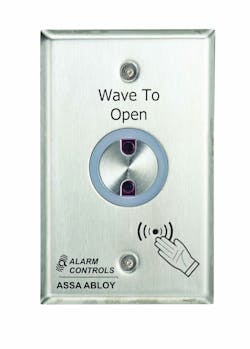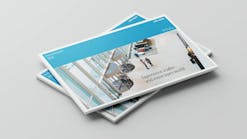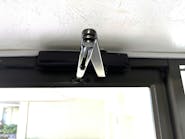
As you might expect, security giant ASSA ABLOY has several products that are aimed at satisfying the increased desire for touchless entryways: door operators, wave-to-open activation switches, request-to-exit motion sensors.
Of course, some of those products also are solutions for the increased demand for so-called frictionless movement in, out and around buildings and properties. One such product is the Securitron R100, a simple retrofit wireless card reader that has HID keycard security as well as the potential for frictionless mobile credentialing through near field communication technology.
The R100, like a lot of the products that ASSA ABLOY is promoting during the COVID-19 pandemic, has been out for a while.
If you get the sense that what ASSA ABLOY is doing is old hat, that’s partly the idea, according to Benjamin Williams, director of product management for ASSA ABLOY ESH, which encompasses the Adams Rite, Alarm Controls, HES and Securitron product lines. He sees a mix of high-tech products joining with low-tech products, such as the recently introduced Rockwood arm pulls or foot pulls on doors, to generate solutions for businesses as they confront a new reality.
“People will have to touch the door again” at some point, Williams says. “How do they feel more comfortable and interact with doors?”
The big consideration is the cost of newer technology. A buzzy phrase in the security industry is “thermal imaging,” where a camera or sensor that has the technology is used to evaluate the risk of disease being spread by measuring a person’s body temperature. Williams points to the discontinued Securitron M680 Magnalock as an example.
“Right now, the short-term reactive is ‘we can do it,’” he says of thermal imaging. “But does it make sense to build it into everything we make? It’s not cheap, and it’s not practical if we start putting a thermal camera in every IP maglock. The M680 had a thermal camera, and we got rid of it.”
The good news for the security professional is that ASSA ABLOY’s touchless solutions are, as noted, nothing new. Williams sees no installation limitations of the technology.
“These are all turnkey solutions that are readily available,” he says. “It’s a matter of willingness and funding.
“One thing I would add is that one of the biggest misnomers would be the auto operator,” he adds. Security pros are “not understanding the operators to the magnitude that they should in this industry. Do they really understand the ‘push and go’ and ways to operate the opening? We can help bolster the education.”
Williams understands the reaction behind the “heightened awareness” for products that include thermal imaging to allow employees to feel safe when they go to work. But even though he reports “triple-digit growth” of the sales of products that provide hands-free entrance and exit, he isn’t sure that touchless entryways will become the default environment.
“I think I would be remiss to say if [touchless is] not the new normal, then it’s the new abnormal,” he says of the circumstances surrounding the coronavirus and the desire to return to pre-pandemic traditions. He sees the acute interest that has arisen as “more of a season thing,” or short term.
“We’ll have a heightened sense of awareness [of touchless] for longer than we’d like, until we have a vaccine for common adoption,” Williams acknowledges.
Longer term, however? Williams definitely sees frictionless passage with mobile being at the center of it and believes that larger corporations, such as Apple or Amazon, will be the leaders. Big corporations, besides having the financial resources, will want to track employees better to assess any potential health risks. They’ll accomplish that through employees’ phones.
“Every business will focus on that way more than traditional things that are more hands-on that require cleaning multiple times a day,” he says. “Trends from corporations cascade to the consumer level, to the retail storefront. It’s silly to not believe that it won’t cascade to their consumers. It will bring worlds together.”
Worlds of products, too, it would seem.
Will Christensen | Senior Editor
Will Christensen is senior editor at Locksmith Ledger International. He has been an editor and reporter at magazines and newspapers for more than 30 years.





